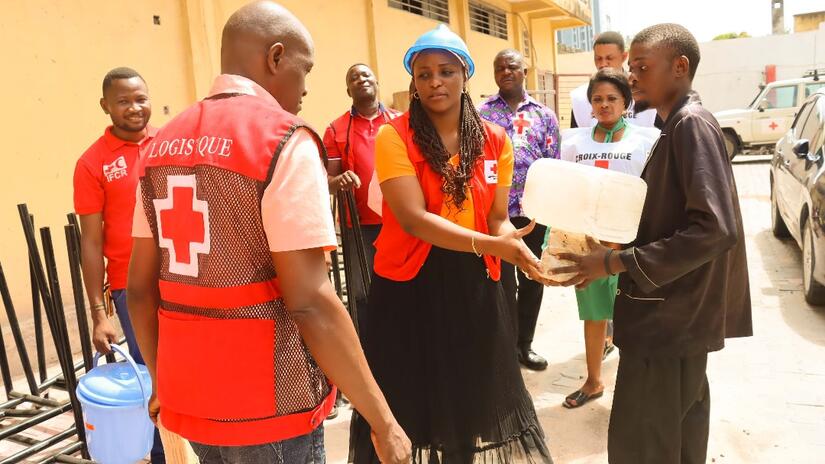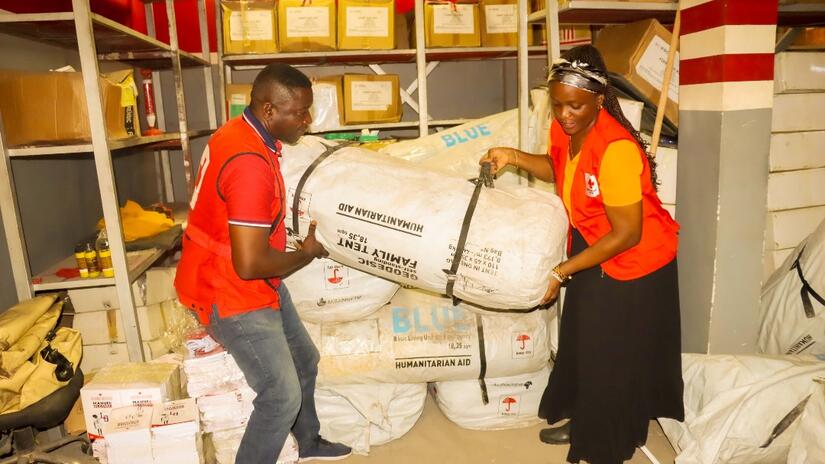Gloria Lombo knows what it takes to rise to the highest level of humanitarian leadership in her country, and she understands the critical importance of protecting women during crisis.
As Secretary General of the Red Cross of the Democratic Republic of the Congo, she is just as comfortable in a business suit as she is in a hard hat, with a shovel in her hand, or handing out aid supplies.
From her years as an acvitist and volunteer, she also understands people power and has the skills and experience to inspire other humanitarians.
Can you tell us a personal story or a situation in which you managed to break ‘feminine’ stereotypes or social expectations?
Of course I can. In Africa, and in the DRC in particular, any professional promotion for women is attributed to what is commonly called "the promotion couch", which means going out with your superior or your boss instead of meritocracy.
It is possible to break through this thinking, and my case illustrates this, which is why I feel comfortable sharing my personal experience.
My professional career at the Red Cross of the DRC began in 2014 as Head of the Gender and Youth Division, and then the Gender and Diversity division, where I ensured the involvement and balanced representation of women, young people and minorities in the activities implemented by the Red Cross of the DRC.
Then, in mid 2019, [I served] as director in charge of General Services (Administration and Logistics) and 2020 as Director of Programmes and Partnership. Since December 2022, I have been serving as Secretary General.
This was all achieved because people could follow my track record of professionalism, acquired experience and capacities. The choice of personnel for the current position is also subject to tests and evaluations of certain objective criteria by the National Society’s Management Committee.

Secretary General of the Red Cross of the Democratic Republic of the Congo, Gloria Lombo hands out relief supplies during a recent emergency response operation.
Photo: Red Cross of the Democratic Republic of the Congo
Is there anything you do in your daily life, whether at work or in your private life, to defend women's rights?
I'm a human rights activist, a defender of women's and girls' rights, a facilitator and a multi-disciplinary trainer on different themes such as prevention of sexual exploitation and abuse and sexual and gender-based violence.
I help women and girls to discover their potential and how to deploy it to be useful in the community. I encourage female candidates to apply for any recruitment notice issued within our institution, with the aim of having a more or less equitable distribution in the various command and management positions within the institution that I lead.
Why do you think we should invest in women? And how should we do it?
Women are human beings who must thrive in the same way as men. She must be autonomous and resilient. Investing in women also means giving her access to the various resources needed to help her overcome the various challenges she faces. This way she can build a world in which she can realise her rights by thriving in all areas (financial, professional, etc.).
For me, investing in women can be summed up with 3 ideas: access to resources, fulfilment and prosperity.
How to invest?
Strengthen her capacities through training, education, etc. “Educating a woman is educating a whole nation", as we say in my homeland in DR Congo.
Position and encourage women in well-paid jobs and sectors.
And provide them with social protection by giving them much greater access to information, the internet, land rights over agricultural land, etc.
How do you help people understand the challenges faced by women in emergency situations in the DRC and elsewhere?
The DRC Red Cross uses the SVEC tool (Study of Vulnerabilities and Enhanced Capacities), which organizes, through principles of social inclusion, community interviews to discuss the issue of women in general and during emergencies. These discussions focus on themes like: women's ability to cope with emergencies; understanding the emergency (nature and consequences) so that she can be properly assisted; the attitude to adopt during an emergency and the actions men can take to support women during emergencies.
Everything goes through this mechanism, which is both an assessment and an awareness-raising exercise.





